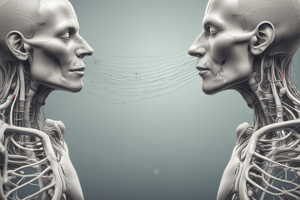Podcast
Questions and Answers
What is the primary function of respiration in living organisms?
What is the primary function of respiration in living organisms?
- Transportation of nutrients to cells
- Uptake of carbon dioxide from the environment
- Release of oxygen into the environment
- Generation of energy in cells (correct)
How is oxygen brought into the body during the process of respiration?
How is oxygen brought into the body during the process of respiration?
- By absorption through the skin
- Through inhalation (correct)
- Through transport by red blood cells
- Through exhalation
What happens to the carbon dioxide produced during cellular respiration?
What happens to the carbon dioxide produced during cellular respiration?
- Absorbed by cells for energy production
- Transported to the liver for storage
- Converted into ATP molecules
- Released into the environment (correct)
Which molecule is produced during cellular respiration that provides energy for cell functions?
Which molecule is produced during cellular respiration that provides energy for cell functions?
Why is the energy produced through respiration critical for living organisms?
Why is the energy produced through respiration critical for living organisms?
Which statement best describes the importance of respiration in living organisms?
Which statement best describes the importance of respiration in living organisms?
How do human lungs contribute to the process of gas exchange?
How do human lungs contribute to the process of gas exchange?
What is the role of water in cellular respiration?
What is the role of water in cellular respiration?
How do specialized respiratory tissues like gills and lungs benefit organisms?
How do specialized respiratory tissues like gills and lungs benefit organisms?
Why is the symbiotic relationship between plants and animals mentioned in the text?
Why is the symbiotic relationship between plants and animals mentioned in the text?
Flashcards are hidden until you start studying
Study Notes
Importance of Respiration
Respiration is the process by which organisms take in oxygen from their environment and release carbon dioxide. It's a vital biological function that provides energy to all living organisms and is essential for maintaining life. Let's explore the importance of respiration in detail.
Oxygen Uptake and Carbon Dioxide Release
Respiration is primarily responsible for the uptake of oxygen, which is essential for the chemical reactions that generate energy in cells. Oxygen is brought into the body through the process of inhalation, usually through the mouth or nose, and then transported to the lungs by the bloodstream. This oxygen is then absorbed into the bloodstream and transported to the body's cells, where it's used in the process of cellular respiration.
During cellular respiration, the oxygen combines with nutrients, such as glucose, to produce energy in the form of ATP (adenosine triphosphate), water, and carbon dioxide. The carbon dioxide is then released into the bloodstream and transported to the lungs for elimination through the process of exhalation.
Energy Production
The energy produced through respiration is critical for the proper functioning of the body's cells and organs. It powers all cellular functions, from the maintenance of cellular structure to the synthesis of proteins, lipids, carbohydrates, nucleotides, and other complex molecules necessary for life. Without proper respiration, cells would lack the energy required to carry out these functions, leading to cell death and potentially larger health issues.
Environmental Adaptations for Oxygen Uptake and Carbon Dioxide Release
The efficiency of respiration varies among different species due to various adaptive mechanisms developed over time. For instance, some animals have evolved specialized tissues, such as gills, lungs, or gills, that assist in oxygen uptake and carbon dioxide release. These adaptations enhance the delivery of oxygen to cells while also facilitating the removal of waste products like carbon dioxide.
In the case of human beings, we rely primarily on our lungs to facilitate gas exchange between air and blood. Our lungs contain millions of tiny sacs called alveoli, where oxygen diffuses into the bloodstream from the surrounding air and carbon dioxide diffuses out of the bloodstream into the alveoli. This process is supported by a network of tubes called bronchioles, which transport air to the alveoli, and capillaries, which deliver the oxygen-rich blood throughout the body.
Cellular Respiration and the Circular Flow of Matter
Cellular respiration plays a significant role in maintaining the circular flow of matter within living systems. As mentioned earlier, it produces water as one of its end products. Water serves as a carrier of nutrients and minerals, making it essential for maintaining the balance of materials needed by cells for growth and maintenance. Additionally, the carbon dioxide produced during cellular respiration contributes to photosynthesis in plants, forming part of the symbiotic relationship between plants and animals.
In summary, respiration is crucial for all living organisms. By facilitating oxygen uptake and carbon dioxide release, it powers the production of ATP, which drives metabolic processes and maintains cellular structures. Through environmental adaptations and cellular respiration, living organisms maintain the circular flow of matter necessary for survival and growth.
Studying That Suits You
Use AI to generate personalized quizzes and flashcards to suit your learning preferences.




